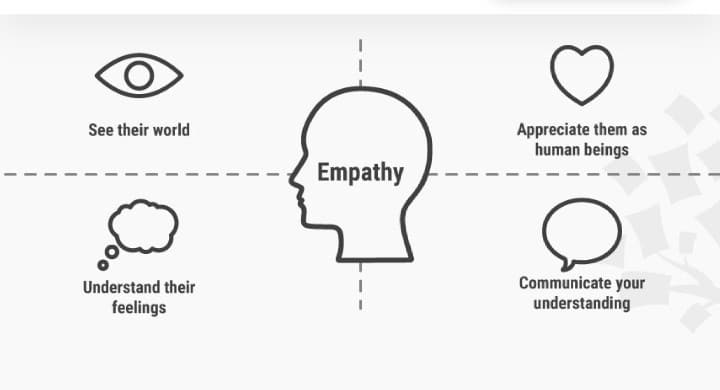In our world today, we come across different people from diverse cultures, languages, and religions. One of the key elements that help us to live peaceably is understanding. In addition, the key to understanding is empathy and it is a behavioral skill needed by every individual. This article goes on to discuss empathy, lack of empathy signs, activities to build empathy. In addition, we’ll also look at ways to develop empathy, empathy vs sympathy, and the importance of empathy.
Definition of Empathy
We can define empathy as the capacity to share or understand and care about what others feel. It is a behavioural skill that may be inborn in an individual or acquired through some specific activities.
Empathy vs Sympathy

Sympathy usually refers to feelings or emotions. It is when one person shares the feelings of another. It is expressed when one experiences sadness when someone close is experiencing grief or loss.
Empathy, however, differs from sympathy as it has a greater emotional distance. It is generally, the imagination of the feelings of others that helps in understanding without necessarily sharing the feelings.
In addition, empathy and sympathy should not be used interchangeably in a text. However, we often encounter them in contexts where their difference is diminished. The difference in meaning should be explained with some variation. Sympathy is when you share the feelings of another whereas empathy is when you understand the feelings of another. But as in empathy, you do not necessarily share them.
The nouns have a common root: the Greek word pathos, meaning “feelings, emotion, or passion.” Pathos itself refers to the show of pity or compassion in a work of art or literature.
Sympathy involves sharing
The common definition of sympathy in the dictionary is the act or capacity of entering into or sharing the feelings or interests of another.” When we hear of sympathy, we tend to think of situations involving emotional pain. For instance; when a friend is grieving over the loss of a loved one, you would want to visit and keep company for some time. This is to show that you feel the person’s loss.
Empathy involves understanding
You have empathy for a person when you can imagine how they might feel based on what you know about that person, despite not having those feelings expressly communicated. Also, empathy can be shown in the familiar idiom “to put oneself in another’s shoes.”
In addition, another major difference between sympathy and empathy is how long each has been around. Therefore, compared to sympathy, which first appeared in English in the 16th century, empathy is a relatively new word coined from the already existing words.
Why is Empathy Important?
This is a trait necessary for building and maintaining great relationships in our workplace, families, and society at large. Individuals who feel empathy enjoy greater happiness and less stress. People lacking in empathy are said to be selfish and wicked. This can be a result of their inability to understand and relate to other people’s views. As a result, we have many failed relationships.
Without empathy, people tend to go about life without considering how other people feel or what they may be thinking. Each of us has a different perspective. We all experience moods, pain and hurt joy, and sadness. Furthermore, we are so limited when we only see our own perspective. Without taking a moment to assess another, it is easy to make assumptions and jump to conclusions. Consequently, this often leads to bad feelings, conflict, poor morale, and even divorce. People do not feel heard or understood. Therefore, empathy is important as it enhances understanding and peaceful coexistence amongst ourselves.
Lack of Empathy signs
Empathic persons are great listeners and often generous. They easily share their problems with people. In addition, they are emotional and often feel overwhelmed by tragic events.
However, lack of empathy means that the person seems distant, unconcerned, and uninterested in the problems of others. This attitude is often harmful to those around them. Furthermore, we should identify these lack of empathy signs in individuals as it’ll help us relate better. Some of these lack of empathy signs include;
#1. They are usually not happy for others.
#2. They can’t control their emotions.
#3. They overreact.
#4. They have shallow emotions.
#5. They are not moved by emotional events.
#6. They have trouble in maintaining relationships.
#7. They trivialize emotional outbursts.
What is Your Level of Empathy?
To determine your level of empathy, ask yourself the following questions:
- Do you have trouble detecting the emotions of those around you?
- Is it difficult to envision how you might feel if you were in someone else’s shoes?
- Are you unconcerned when you see other people suffering?
- Do you stop listening to others when you disagree with them?
- Do you avoid assisting those who are distressed, hurt, or in a disadvantageous situation?
If you responded yes to most of the following questions, you probably have trouble feeling empathy for others. While this can be difficult, there are steps you can take to become more sympathetic.
Causes of Lack of Empathy Signs
The precise origins of a lack of empathy are unknown, however a variety of factors are thought to play a role. Genetics and socialization are thought to have a substantial influence on empathy.
The heritable characteristics of personality and temperament are influenced by genetics. As a result, some people are born with traits that make them more sensitive to others. However, living experiences play a significant impact as well.
Kindness, empathy, compassion, and helping behaviors are influenced by parents, teachers, peers, society, and culture.
Some study also suggests that men and women experience and display empathy in different ways. Women often outperform men on measures of empathy. 1
Some illnesses, such as narcissistic personality disorder (NPD), antisocial personality disorder, and borderline personality disorder, may contribute to a lack of empathy (BPD).
Effects of Lack of Empathy Signs
A lack of empathy signs can have a variety of consequences. Among them are the following:
#1. Relationship issues:
People who lack empathy are more prone to have troubles in their relationships with others. When other people believe that their feelings and needs are not being acknowledged, it can lead to disputes. It can also make it more difficult to develop ties and less likely that people will obtain effective assistance.
#2. Poor communication:
Not understanding where others are coming from can make conversation much more challenging. A lack of empathy can also lead to people misinterpreting what others are trying to communicate, which can lead to miscommunication, conflict, and broken relationships.
#3. Lack of helping behaviors:
When persons lack empathy for others, they are less likely to engage in prosocial behaviors that could aid others in need. This can have an individual impact, but it can also have a wider systemic impact when groups, governments, or cultures fail to exhibit empathy toward those in need of assistance.
In healthcare settings, a lack of empathy can have serious implications. According to research, medical training reduces the empathy of healthcare providers. 2 This can lead to uncaring care, poor health outcomes, and negative patient experiences.
How to Show Empathy
#1. Be intentional.
#2. Put away distractions.
#3. Recognize your judgments.
#4. Don’t always try to solve problems.
#5. Share your feelings and experience.
#6. Show gratitude that the person opened up.
#7. Be encouraging and show support.
#8. Be open to other people’s perspectives.
#9. Encourage collaboration.
#10. Listen to your team.
#11. Prioritize employee wellness over goals.
#12. Always be thankful.
Read also: Empathy examples: 45+ examples with empathy statements
Ways to develop empathy
Oftentimes life experiences can help to teach us to be more empathic, as the saying goes that experience is the best teacher. Stephanie Thoma, a career coach said,
“Losing a job I relied on and self-identified with early on in my career gave me more compassion and empathy for those who are between jobs. I experienced depression, anxiety, and uncertainty that can come with a job loss. That experience gives my work of helping people bounce back that much more resonance and meaning.
stephaniethoma.com
However, we can also build our empathy by learning from the experience of the people around us. In addition, there are also various practices/ activities that can help to build our empathy.
Teaching Empathy
Empathy, though a complex skill can be taught just like anything else. It is widely agreeable that the learning process is faster with kids than with adults. Consequently, it is important that kids are taught this skill while they are still young. It is vital that educators recognize that lack of empathy is a skill deficit and not a character problem.
In the words of Ross Greene, “Kids do well if they can”. Consequently, this implies that someone lacking in empathy can improve and be more empathic when taught appropriately. However, there are several ways to teach, emphasize and demonstrate skills for empathy. That is to say, these abilities can be learned.
In addition, it is worthy to note that some learners are going to struggle with these skills more than others. Therefore, teaching this skill will involve a slow but steady process.
Empathy Activities for Kids in the US
#1. Building emotion vocabulary.
Here, the tutor can give some examples of words that show emotions. They discuss the meaning of the words together, relating them to empathy. Also, the children will then give more examples and note them down.
#2. Identifying and practicing of emotions.
This should be so much fun as possible. Firstly, the tutor calls out the students one after another and asks them to demonstrate different emotions. The rest of the students will now try to identify the emotions expressed. So, this will help the students to understand and interpret facial gestures, thereby developing their empathy skills. The kids should also try to identify lack of empathy signs through play or drama.
#3. Practice active listening.
The instructor will read a text to the hearing of the students. The students will listen attentively and make a summary of what they have heard. In addition, the students can also be asked questions in between the reading exercise. This will enhance their listening ability hence improving empathic skills.
#4. Making paper collage
This is especially for shy students that cannot express themselves in front of the classroom. The students will be given cards which they will use to make a paper collage. Thereafter, they will be matching pictures showing different facial gestures to the corresponding emotion shown. They should be able to deduce the empathy signs shown in the cards.
Building Empathetic Adults
However, ways to develop empathy in adults may differ from the way to develop it in kids. It’s not so easy to develop but with constant efforts, we can achieve it.
#1. Building Friendships
Empathy dissolves when we see the world in terms of ‘us and them’. However, it recovers when it returns to ‘you and I’. In other words, enemies eventually become friends when we try to view the intent of their actions as friendly.
#2. Being Curious
This enables us to know one’s intent or feeling, thereby understanding them and their lifestyle. We can achieve this by following people on social media with different backgrounds other than you.
We can also go beyond small talks like ‘how are you doing and ask about how people’s daily lives are like.
#3. Listen Attentively
Putting away your phone and other distractions helps you to listen and notice facial expressions and gestures. So, these facial expressions and gestures are of great importance when trying to understand someone.
#4. Reading Books
This is another great way of knowing about different lifestyles and cultures. This will help us understand people more easily.
#5. Visiting other people’s places of worship, their families and community
This enhances positive interactions amongst individuals. It’s necessary because this is where their thoughts and beliefs will be built. As a result, it improves understanding of people’s perceptions and actions.
#6. Engaging in volunteer works in less privileged communities.
This helps one be more empathic. It enables us to examine the privileges we have over others. So, this helps us to make a better judgment and develop our emotional response.
What are the benefits of having empathy in the workplace?
Having empathy in the workplace can lead to improved communication, better relationships with coworkers, increased job satisfaction, and reduced conflicts. It can also result in better customer service and increased productivity.
What are the challenges of showing empathy?
Challenges of showing empathy can include difficulty in putting oneself in another person’s shoes, cultural differences, and personal biases. Empathy can also be difficult to express in high-stress situations.
What is the relationship between empathy and compassion?
Empathy refers to the ability to understand and share the feelings of others, while compassion is the act of caring for and seeking to alleviate the suffering of others. Empathy is a key component of compassion, as it allows one to understand the experiences and emotions of others.
How does empathy impact mental health?
Empathy can have a positive impact on mental health by reducing stress and anxiety, promoting positive relationships, and providing a sense of purpose and fulfillment. By allowing individuals to connect with others on an emotional level, empathy can also help reduce feelings of loneliness and isolation.
Can empathy be taught?
Yes, empathy can be taught through various methods such as exposure to diverse experiences, active listening, and mindfulness exercises. Empathy can also be developed by seeking to understand others’ perspectives, practicing perspective-taking, and engaging in reflective and introspective activities.
How does empathy affect relationships?
Empathy can have a positive impact on relationships by promoting understanding, trust, and connection. When individuals are able to understand and share the feelings of others, they can develop deeper and more meaningful relationships. Empathy can also help reduce conflicts and improve communication in relationships, making them stronger and more resilient.
Conclusion
In conclusion, empathy is very important in our society, and its importance cannot be overemphasized. Compassion may come naturally to you. That is to suggest that responding to it could be part of our biological make-up. However, we should improve this skill as much as possible, as it adds great value to relationships.
Empathy FAQ’s
What is a Good Example of Empathy?
Assume your pet dog is terminally ill. You do your best to make her happy and comfortable for as long as possible, but there comes a time when she is in too much agony to enjoy her existence. You take her to the veterinarian and have her euthanized. This is a decision based on empathy.
What is a Person who has no Empathy called?
A lack of empathy and guilt, as well as shallow affect, glibness, manipulation, and callousness, characterize psychopathy.
What causes lack of empathy in adults?
Some illnesses, such as narcissistic personality disorder (NPD), antisocial personality disorder, and borderline personality disorder, may contribute to a lack of empathy (BPD).
Is it bad to not have Empathy?
A lack of empathy can certainly have consequences, but it does not imply that you are a bad person or that you cannot learn to develop greater empathy. People who lack or suffer from empathy may experience social isolation, as well as other undesirable effects or repercussions.
Related Articles
- Examples of empathy: 45+ Examples with empathy statements
- FINANCIAL LITERACY FOR KIDS: BASIC LESSONS AND ACTIVITIES FOR ALL GRADES
- The Importance of Empathy for Business Graduates
- INTERPERSONAL SKILLS: DEFINITION, Examples, All you need & how to improve (+free PDF’s)
- 30 Most Searched Customer Service Skills (full details)






